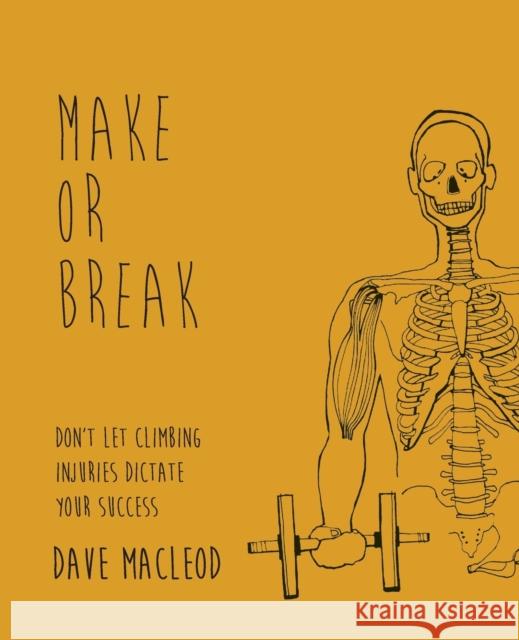Make or Break: Don't Let Climbing Injuries Dictate Your Success » książka
Make or Break: Don't Let Climbing Injuries Dictate Your Success
ISBN-13: 9780956428134 / Angielski / Miękka / 2015 / 228 str.
As Wolfgang Gullich said, getting strong is easy, getting strong without getting injured is hard . Sooner or later, nearly all climbers get injured and it will be injuries that ultimately dictate how far you get in climbing, if you let them. Unfortunately, the data shows it takes over a decade just to get small proportions of medical research adopted in regular practice. Sourcing reliable and up to date advice on preventing and treating finger, elbow, shoulder and other climbing injuries is challenging to say the least. You need to be the expert, because there are so many strands of knowledge and practice to pull together to stay healthy as a climber, and no single source of advice to cover all of these. The book draws together both the cutting edge of peer reviewed sports medicine research, and the subtle concepts of changing your climbing habits and routine to prevent and successfully recover from injuries. It is a handbook on how to take care of yourself as a lifelong climbing athlete. By spanning the fields of climbing coaching, physiotherapy, sports medicine and behavioural science, it goes beyond the general advice on treating symptoms offered by sports medicine textbooks and into much more detail on technique and habits specific to climbing than the existing climbing literature base. You will learn how your current climbing habits are already causing your future injuries and what you can do to change that. If you are already injured, it will prevent you from prolonging your injury with the wrong climbing habits and rehabilitation choices. You will learn how the ingredients of prevention and good recovery come from wildly different sources and how you have been using only a fraction of them. Fully referenced throughout, the practical advice for diagnosis, rehabilitation and prevention of climbing injuries is drawn from up to date peer reviewed sports medicine research. "
As Wolfgang Gullich said, “getting strong is easy, getting strong without getting injured is hard”. Sooner or later, nearly all climbers get injured and it will be injuries that ultimately dictate how far you get in climbing, if you let them.Unfortunately, the data shows it takes over a decade just to get small proportions of medical research adopted in regular practice. Sourcing reliable and up to date advice on preventing and treating finger, elbow, shoulder and other climbing injuries is challenging to say the least. You need to be the expert, because there are so many strands of knowledge and practice to pull together to stay healthy as a climber, and no single source of advice to cover all of these.The book draws together both the cutting edge of peer reviewed sports medicine research, and the subtle concepts of changing your climbing habits and routine to prevent and successfully recover from injuries. It is a handbook on how to take care of yourself as a lifelong climbing athlete. By spanning the fields of climbing coaching, physiotherapy, sports medicine and behavioural science, it goes beyond the general advice on treating symptoms offered by sports medicine textbooks and into much more detail on technique and habits specific to climbing than the existing climbing literature base.You will learn how your current climbing habits are already causing your future injuries and what you can do to change that. If you are already injured, it will prevent you from prolonging your injury with the wrong climbing habits and rehabilitation choices. You will learn how the ingredients of prevention and good recovery come from wildly different sources and how you have been using only a fraction of them. Fully referenced throughout, the practical advice for diagnosis, rehabilitation and prevention of climbing injuries is drawn from up to date peer reviewed sports medicine research.











